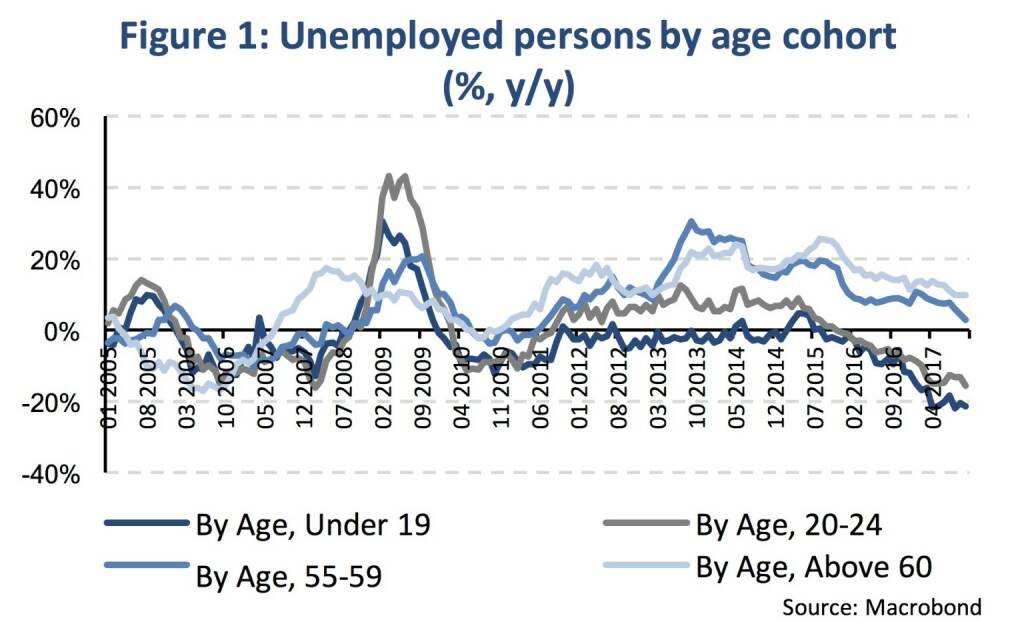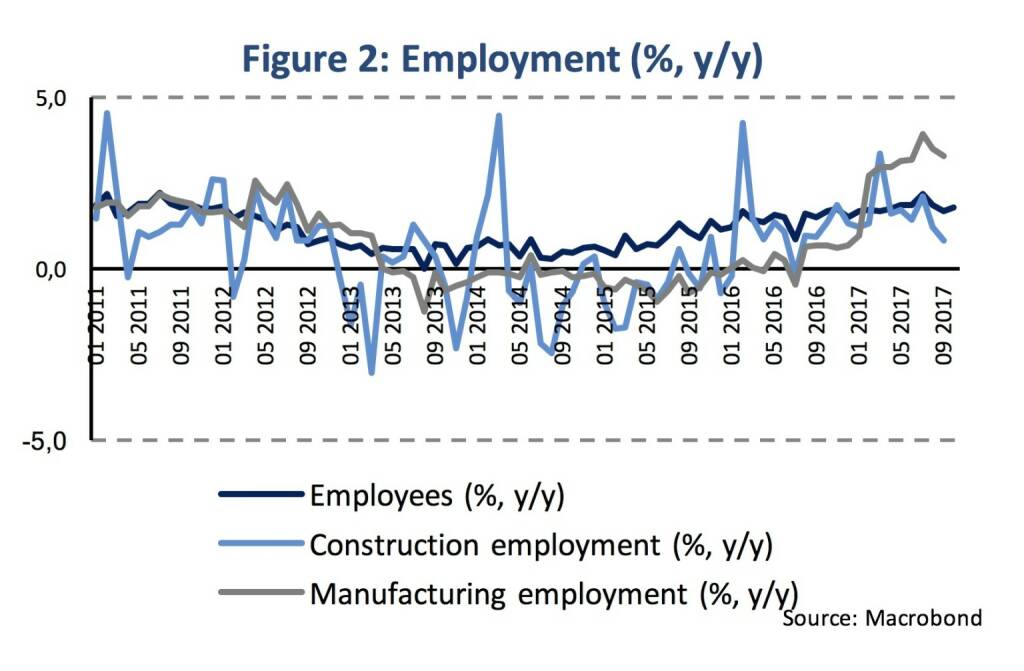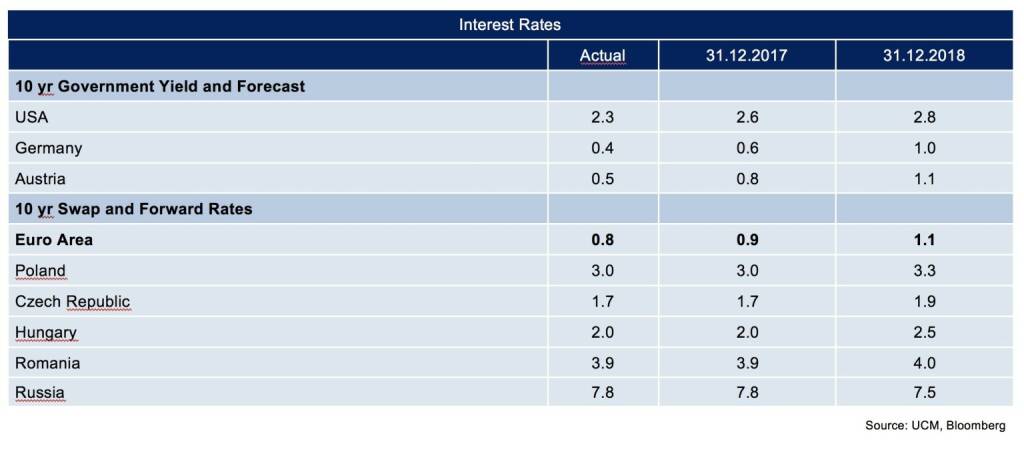Solid Q3 GDP released last week for Austria and the total of the Euro Area (Martin Ertl)
- Solid Q3 GDP released last week for Austria and the total of the Euro Area.
- The conditions in the Austrian labor market keep improving amid the sound business cycle.
The Austrian economy continues a strong growth trajectory. According to the flash estimate from the Austrian Institute of Economic Research (Wifo), real GDP increased by 0.8 % (q/q) in the third quarter after it had expanded by 0.9 % quarterly in H1 2017 (trend business cycle component). In seasonally and working day adjusted terms (Eurostat), the quarterly increase in GDP was 0.6 % in Q3. The recovery is broad based across expenditure components. Both household consumption (0.4 % q/q) and fixed investment (07 %) as well as net exports make the economy grow. Exports and imports rose by 0.8 % each in Q3. In annual terms, GDP expanded by 2.6 % after 2.8 % in the previous quarter.
The conditions in the Austrian labor market continued to improve in October. According to the Public Employment Service Austria (AMS), the total number of unemployed amounted to 315.722 persons (excluding persons in training) and was 7.4 % lower than in the corresponding month last year. The unemployment rate was 7.9 % as per the national methodology and 5.6 % according to Eurostat (seasonally-adjusted). In September, there were 9 countries in the EU recording a lower unemployment rate than Austria. While youth unemployment has been declining, the trends among the elderly unemployed remained a cause of concern (Figure 1).
The number of unemployed persons aged 55-59 rose by 3.1 % and persons of age 60 or above increased by 10.0 % in October. Total gross industry wages increased by 2.9 % on average during the three months until August. Fostered by the solid business cycle, total employment has been expanding (1.8 % y/y in October). Employment in the manufacturing and construction sectors grew by 3.3 % and 0.8 % (y/y) in September (Figure 2).
As widely expected, the business cycle remained solid across the entire Euro Area. As per the first estimate, Eurozone GDP expanded by 0.6 % (q/q) and 2.5 % annually. Among further early Q3 GDP releases were France, Spain and Belgium. Uncertainty from Catalonia’s independence vote and political turmoil has not yet inflicted headline GDP growth. Real GDP rose by 0.8 % (q/q) and 3.1 % (y/y) in Q3 2017 in Spain. In France, the economy grew by 0.5 % quarterly and 2.2 % (y/y) and Belgium’s GDP rose by 0.3 % and 1.7 % yearly. Our GDP tracking estimate (as of 3rd November), that is based on a dynamic factor model, signals 0.6 % quarterly GDP growth in the final quarter of 2017 (Figure 3).
Authors
Martin Ertl, Franz Zobl
Chief Economist Economist
UNIQA Capital Markets GmbH UNIQA Capital Markets GmbH
Disclaimer
This publication is neither a marketing document nor a financial analysis. It merely contains information on general economic data. Despite thorough research and the use of reliable data sources, we cannot be held responsible for the completeness, correctness, currentness or accuracy of the data provided in this publication.
Our analyses are based on public Information, which we consider to be reliable. However, we cannot provide a guarantee that the information is complete or accurate. We reserve the right to change our stated opinion at any time and without prior notice. The provided information in the present publication is not to be understood or used as a recommendation to purchase or sell a financial instrument or alternatively as an invitation to propose an offer. This publication should only be used for information purposes. It cannot replace a bespoke advisory service to an investor based on his / her individual circumstances such as risk appetite, knowledge and experience with financial instruments, investment targets and financial status. The present publication contains short-term market forecasts. Past performance is not a reliable indication for future performance.
Imprint
Information required pursuant to the Austrian Media Act
Publisher of this publication:
UNIQA Insurance Group AG
Untere Donaustraße 21, A-1029 Vienna, Austria
Media owner of this publication:
UNIQA Capital Markets GmbH
Untere Donaustraße 21, A-1029 Vienna, Austria
Management Board of UNIQA Capital Markets GmbH:
Dr. Andreas Bertl, Mr. Franz Hagmann
UNIQA Capital Markets GmbH is constituted as a limited liability company; the media owner is licenced as an investment firm and regulated by the Austrian Financial Market Authority (FMA-Finanzmarktaufsicht).
Ownership structure of the media owner:
UNIQA Insurance Group AG is 100% owner of UNIQA Capital Markets GmbH.
Basic tendency of the content of this publication:
Information on general economic data.



Latest Blogs
» Zahlen von Marinomed und Agrana, Research ...
» Wiener Börse Party #630: Zu Mittag kündigt...
» Nachlese: Wienerberger 155, B&C überlegt C...
» Wiener Börse zu Mittag schwach: Warimpex, ...
» Börsenradio Live-Blick 16/4: DAX und ATX v...
» ABC Audio Business Chart #100: Worüber sic...
» Wiener Börse Party 2024 in the Making, 16....
» ATX-Trends: Semperit, Amag, Palfinger, DO&...
» Österreich-Depots: Um die Null-Linie (Depo...
» Börsegeschichte 15.4.: Wienerberger, Zumto...
Weitere Blogs von Martin Ertl
» Stabilization at a moderate pace (Martin E...
Business and sentiment indicators have stabilized at low levels, a turning point has not yet b...
» USA: The ‘Mid-cycle’ adjustment in key int...
US: The ‘Mid-cycle’ interest rate adjustment is done. The Fed concludes its adj...
» Quarterly Macroeconomic Outlook: Lower gro...
Global economic prospects further weakened as trade disputes remain unsolved. Deceleration has...
» Macroeconomic effects of unconventional mo...
New monetary stimulus package lowers the deposit facility rate to -0.5 % and restarts QE at a ...
» New ECB QE and its effects on interest rat...
The ECB is expected to introduce new unconventional monetary policy measures. First, we cal...
